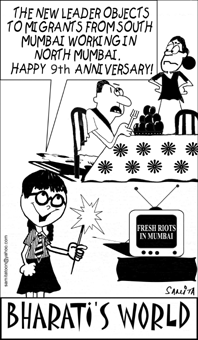Despite all the faults and inherent contradictions of Marxist ideology, to their credit the CPSU (Communist Party of the Soviet Union) and CCP (Chinese Communist Party) ensured that in the societies they governed, foundational primary education was not neglected. That’s why several decades later Russia and the former Soviet republics (after the collapse of the Soviet Union in 1989), and China (after liberalisation of its economy in 1978), boast human development indicators which are a shinning contrast to India’s. Regrettably the CPM (Communist Party Marxist)-led Left Front government, which has ruled West Bengal for three decades since 1977, hasn’t learnt this lesson from the CPSU or CCP.
On October 1, a division bench of the Calcutta high court (coram: S.S. Nijjar, CJ and Pinaki Ghosh, J) ruled that recognition of West Bengal’s 142 Primary Teacher’s Training Institutes (PTTIs) by the Delhi-based National Council of Teacher Education (NCTE) is mandatory. Ironically 58 of the state’s 142 unrecognised institutes are run by the state government itself. Consequently the diplomas issued or to-be-issued by these institutes have been reduced to the status of worthless scraps of paper.
In one fell swoop, the career prospects of an estimated 75,000 elementary school teachers employed by 52,000 government primary schools in the state have been blighted. Nor can the education they dispense to the 7.77 million primary school children in the state expected to be great shakes either.
Under the National Council of Teacher Education Act 1993 passed by Parliament, NCTE is given a broad mandate to supervise teacher education programmes at pre-primary, primary, secondary and senior secondary stages in schools, and non-formal education, part-time education, adult education and distance (i.e. correspondence) education courses. The council is also empowered to approve and accredit state level institutions offering courses or training in teacher education. NCTE approved courses are of two years’ duration.
However the West Bengal government has paid scant attention to the NCTE Act. It decreed that the 142 institutes offering primary teacher training programmes should be approved by the West Bengal Board of Primary Education (WBPE). Moreover the department of school education granted this board the authority to manage, control and conduct a one-year teacher training programme in the state’s 142 PTTIs. Although aspiring teachers who complete the WBPE study programme are eligible for employment only in West Bengal, the state government is unfazed. “With 55,000 teacher vacancies in our primary schools, there’s an urgent demand for primary school teachers in the state. We can’t afford a two-year study programme,” says an education department official.
 The state government’s quick-fix solution has been rendered null and void now that the Calcutta high court has made NCTE recognition mandatory for all PTTIs. However school education minister Partha De isn’t worried. “I can assure you that the problem will be solved,” says De whose approach towards finding solutions is wholly bureaucratic. “A three member committee will go to NCTE’s eastern regional office at Bhubaneswar and request for recognition of these institutes.”
The state government’s quick-fix solution has been rendered null and void now that the Calcutta high court has made NCTE recognition mandatory for all PTTIs. However school education minister Partha De isn’t worried. “I can assure you that the problem will be solved,” says De whose approach towards finding solutions is wholly bureaucratic. “A three member committee will go to NCTE’s eastern regional office at Bhubaneswar and request for recognition of these institutes.”
But according to NCTE’s Bhubaneswar-based officials, no such request had been received until the time of writing this dispatch (October 29). Says R.D. Sharma, regional director of NCTE’s eastern region: “The last date for receiving applications for change of PTTI status is October 31. After that we will not entertain any requests. When it was known that NCTE recognition is mandatory, why did the government allow WBPE to mandate a one-year study programme?” he asks.
There are other complications. NCTE officials highlight that while the council’s minimum qualification for enrolling students in PTTIs is higher secondary (Plus Two) certification, the West Bengal government allows secondary school (class X) certified candidates to enroll in its PTTIs. Besides, as already pointed out above, the WBPE prescribed courses are of one-year duration, while NCTE requires recognised PTTIs to offer a two-year study programme.
With the high court having given its ruling and NCTE waiting impatiently for appropriate applications from the West Bengal government, the responsibility to break this impasse has devolved upon the beleaguered CPM-led Left Front government for whom education is a low priority issue. But the solution won’t come in a day. NCTE’s Sharma (quoted above) says: “The only solution is if the state government appeals to the Centre to promulgate an ordinance that recognises the degrees of those who have passed from the 142 disqualified PTTIs.”
Yet pending resolution of this imbroglio, it won’t be West Bengal’s under-qualified teachers who suffer: it will be children.
Sujoy Gupta (Kolkata)